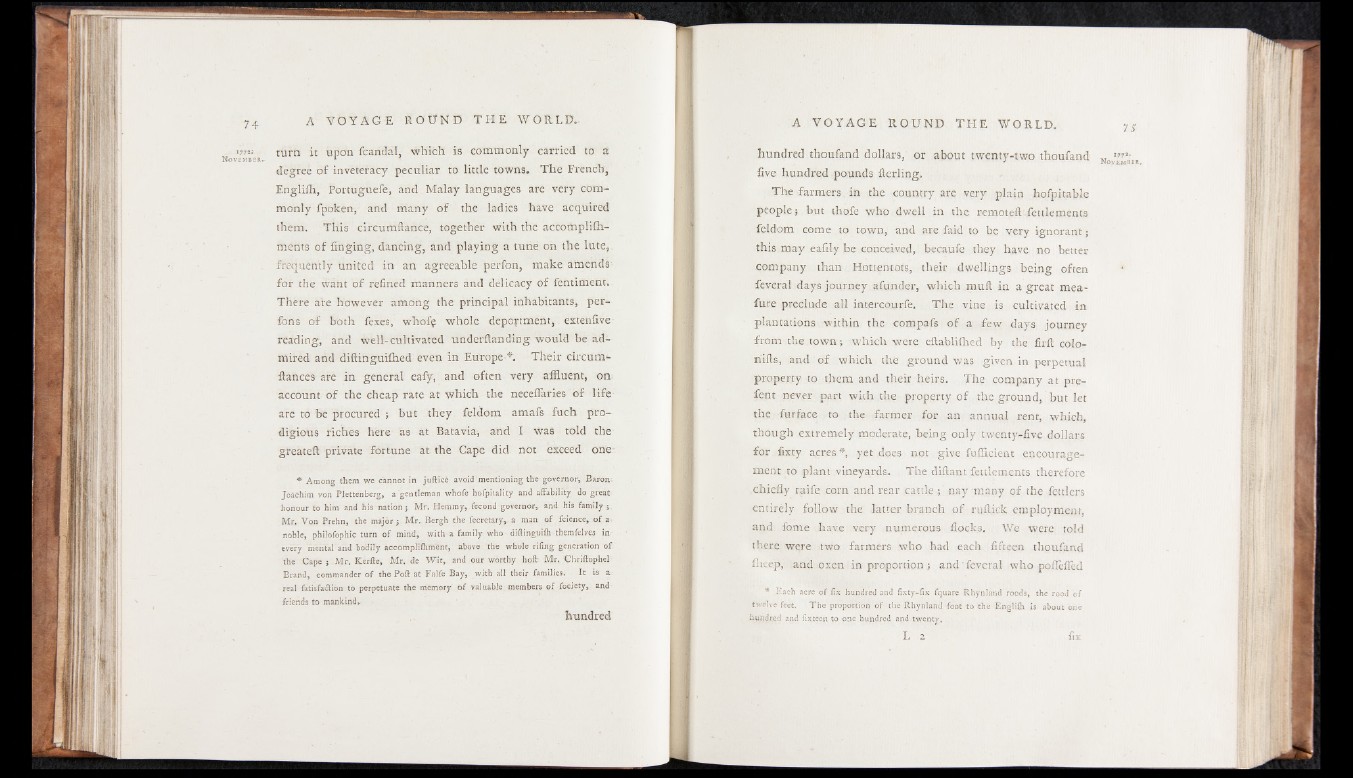
'7?*: turn it upon fcandal, which is commonly carried to a
November.- 1 ■
degree of inveteracy peculiar to little towns. The French,
Englifh, Portuguefe, and Malay languages are very commonly
fpoken, and many of the ladies have acquired
them. This circumftance, together with the accomplifh-
ments of finging, dancing, and playing a tune on the lute,,
frequently united in an agreeable perfon, make amends
for the want of refined manners and delicacy of fentiment..
There are however among the principal inhabitants, per-
fons of both fcxes, whoff whole deportment, extenfive
readings and well-cultivated underftanding would be admired
and diftinguiflied even in Europe *. Their circum-
fiances are in general eafy, and often very affluent, on
account of the cheap rate at which the neceflaries of life
are to be procured ; but they feldom amafs fuch prodigious
riches here as at Batavia* and I was told the
greateft private fortune at the Cape did not exceed one-
* Among them we cannot in juftice avoid mentioning the governor, Baron;
Joachim von Piettenberg, a gentleman whofe hofpitality and affability do great
honour to him and his nation; Mr. Hemmy, fecond governor, and- his family
Mr. Von Prehn, the major; Mr. Bergh the fee rotary,, a man of fcience, o f a.
noble, philofophic turn of mind, with a family who diflinguifh themfelves in-
every mental and bodily accomplifhment, above the whole riling generation o f
the Cape ; Mr. Kerfte, Mr. de W i t , and our worthy hoft Mr. Chriftophel
Brand, commander o f the Poll at Falfe Bay, with all their families. It is a.
real fatisfa£Hon to perpetuate the memory o f valuable members of fociety, and
friends to mankind».
hundred
hundred thoufand dollars, or about twenty-two thoufand „ '” *■ {' Novemb
five hundred pounds flerling.
The farmers. in the country are very plain hofpitable
people; but thofe who dwell in the remotefi: fettlements
feldom come to town, and are faid to be very ignorant;
this may eafily be conceived, becaufe they have no better
company than Hottentots, their dwellings being often 4
feveral days journey afunder, which mull in a great mea-
fure preclude all intercourfe, The vine is cultivated in
plantations within the compafs of a few days journey
from the town ; which were eftablifhed by the firft colo-
hills, and of which the ground was given in perpetual
property to them and their heirs. The company at pre-
fent never part with the property of the ground, but let
the furface to the farmer for an annual rent, which,
though extremely moderate, being only twentynfive dollars
for fixty acres *, yet does not give fufficient encouragement
to plant vineyards. The diftant fettlements therefore
chiefly raife corn and rear cattle 5' nay many of the fettlers
entirely follow the latter branch of ruftick employment,
and fame have very numerous flocks. We were told
there were two farmers who had each fifteen thoufand
flicep, and oxen in proportion ; and' feveral who pollefied
* Each acre of fix hundred and fixty-fix fquare Rhynland roods, the rood of
twelve feet. T h e proportion of the Rhynland foot to the Englifli is about one
hundred and fix-teen to one hundred and twenty.
L 2 • fir